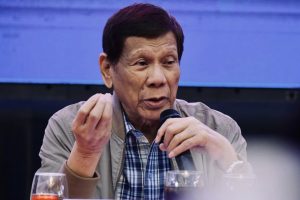Retired and active officers of the Armed Forces of the Philippines and the leadership of the House of Representatives have expressed support to Philippine President Ferdinand “Bongbong” Marcos Jr. after former President Rodrigo Duterte called for military action against the incumbent government.
“There is a fractured governance in the Philippines today. It is only the military who can correct it,” Duterte said in a press conference in reaction to the ongoing anti-corruption probe involving the office of his daughter, Vice President Sara Duterte.
The elder Duterte repeated his accusation that his successor is a “drug addict.” His supporters assembled in Manila and called for an uprising but this didn’t gain traction.
In typical Duterte doublespeak, the former leader claimed he was not calling for a coup and simply advised the military to take responsibility. His former police chief also clarified that Duterte only mentioned the options available for the military.
But the office of the executive secretary denounced the “brazen call” of Duterte for a “coup” and vowed that “the state will act resolutely to go against all unlawful attempts and challenge.”
The Department of Justice also condemned Duterte’s statements. “The military has no direct role in civil governance, and the former President should not attempt to provoke the military into acting as a solution to a so-called fractured governance,” it stated. It warned that “such actions may be considered seditious and legally actionable.”
In a media interview, a former general asserted that the military is loyal to the Constitution. “In the end, what prevails to the military people is the common good, the greater good,” the general said.
Meanwhile, the military leadership affirmed its support for the Marcos government, saying that the armed forces “will remain professional, mission-focused, and always supportive of [the] duly-constituted government.”
On December 4, members of the House of Representatives went to the presidential palace to present a manifesto and resolution supporting the Marcos presidency. The manifesto mentions their commitment to protect the nation from “internal and external threats” that seek to undermine the country’s independence and security.
The resolution made reference to “serious and dangerous remarks and defiant acts that threaten the very foundation of democratic governance, rule of law, and public trust and integrity of government institutions.”
The manifesto confirmed the mobilization of “all legislative resources” to protect the president. “We categorically condemn any attempts to destabilize the government or subvert the administration’s programs aimed at advancing national progress,” it said.
The House is led by Marcos’ first cousin, Martin Romualdez, who is accused by the Dutertes of orchestrating the corruption probe against the vice president in order to become the only strong contender in the 2028 presidential election.
The House will make an important decision this week on whether or not to endorse the two impeachment complaints filed against Vice President Duterte in recent days. Marcos has discouraged legislators from initiating a “divisive” impeachment process but the clamor for accountability over Duterte’s anomalous use of funds remains strong.
Regardless of the impeachment vote, Vice President Duterte continues to face investigation over the death threats she made against the First Family on social media. Former President Duterte could also face raps over his “seditious” remarks, in addition to being subject to an arrest warrant in connection to the International Criminal Court’s ongoing investigation into his violent “war on drugs.”
In the past month, the Dutertes attended Congress hearings and faced off with their accusers, mobilized loyal supporters in the streets, and even tried to encourage military action. Despite these efforts, they failed to prevent various groups and institutions from initiating impeachment proceedings and other mechanisms aimed at pursuing accountability over their alleged criminal actions.
The Dutertes have decried these moves as political harassment after the collapse of the unity government that was formed after the 2022 election. But those who have been actively demanding accountability and justice are not pro-Marcos forces but opposition groups, civil society formations, and victims of Duterte’s “war on drugs” and “war on dissent.” The same groups have been consistently protesting against the continuing human rights abuses under the Marcos presidency.
The Marcos-Duterte rift might appear to be a mere rivalry of clans contesting for power but both sides need to recognize the rising public outrage over corruption, abuse of power, and indifference to the plight of ordinary citizens.

































